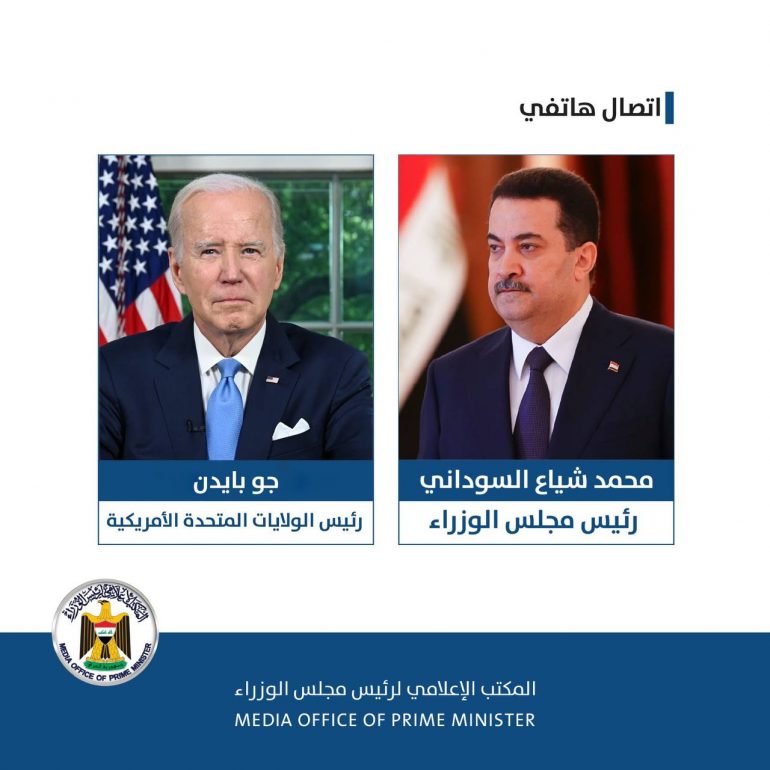2022 was the deadliest year since 2015, with more than 18 civilians killed and dozens injured.
Readout from the White House on the phone call between the U.S. president and the Iraqi premier:
KDP’s Shirwan Duberdani told Sumaria News that the Kurdistan Region's oil exports would be a key discussion point during the KRG delegation’s visit to Baghdad.
Another crucial topic for tomorrow’s meeting includes the upcoming payment of the 700 billion dinars required by Erbil for the Kurdistan Region of Iraq's (KRI) public sector salaries.
The KRG has insisted that it has complied with all the conditions stipulated in the federal budget law. This meeting aims to express Erbil’s willingness to resolve any concerns Baghdad might have out of good intentions.
However, it appears that Baghdad maintains some reservations, as discussions, including auditing work on the KRI’s non-oil revenues and data on its public sector, are still ongoing.
Haval Abubakir, the governor of Sulaymaniyah, commented on the teachers’ boycott, urging Baghdad to dispatch the region’s salaries to "end this situation for the greater good." He expressed gratitude to all the teachers who have resumed their duties, noting that the majority have now returned to the classrooms.
PM Sudani’s statement on the meeting with KRG’s Health Minister didn't address the reason the Erbil officials were in Baghdad. As we reported yesterday, Barzani was in Baghdad to discuss the Kurdistan Region's share of the sovereign budget related to health needs with the Iraqi Premier.
“The main goal of the visit is to ensure the federal government meets its obligations to provide medicine and medical supplies, as mandated by the Iraqi Budget Law for 2032. This responsibility is expected to be carried out by the of the federal government's Council of Ministers.”
We wait to see how the KRG reports on the meeting.
Just in: Prime Minister Sudani Meets the KRG health minister in Baghdad
Statement by PM's office
Prime Minister Mohammed S. Al-Sudani received the Minister of Health of the Kurdistan Regional Government of Iraq, Mr. Saman Hussein Mohammad, in the presence of the Federal Minister of Health, Mr. Saleh Al-Hasnawi.
During the meeting, His Excellency emphasized the government's commitment to the health sector, designating it as a high priority. The goal is to enhance and improve the quality of medical services offered to citizens across the nation.
The Prime Minister underscored the necessity of ongoing coordination between the federal health departments and the health departments in the Kurdistan Region of Iraq. This coordination is vital for integrating efforts and unifying healthcare initiatives, with the aim of overcoming obstacles and delivering the best possible health services to all citizens.
Suspected drone attack near Koya leaves one dead and two injured
It’s been a busy few days in Baghdad, with the Iraqi capital hosting Arab officials discussing the Israel-Palestine conflict.
Earlier today, Iraqi Foreign Minister Fuad Hussein met with Ahmed Aboul Gheit, the secretary general of the League of Arab States. They discussed the escalating situation in the Palestinian territories. Hussein emphasized the need for a unified Arab and Islamic stance, according to a statement from the ministry.
Hussein called for immediate measures "to curb the ongoing hostilities and violations perpetrated by occupation authorities against the Palestinian people."
He reiterated Iraq's position on current events in Palestine, noting high-level diplomatic efforts are underway to facilitate humanitarian aid delivery to the Gaza Strip.
Hussein warned further displacement of the Palestinian people would have severe consequences. He urged Arab nations to take decisive action implementing international resolutions recognizing the Palestinian people's rights.
This comes as earlier reports indicated that factions of the pro-Iran Popular Mobilization Forces (PMF) including Kataib Hezbollah have threatened to target U.S. interests with missiles and drones if Washington intervenes in support.
Hadi Al-Amiri, leader of the Badr Organization, has also said, "If they intervene, we would intervene ... we will consider all American targets legitimate."
On Monday, Amiri told the President of the Palestinian National Council, Rawhi Fattouh, "our hearts and swords are with you."
Iraqi premier discusses U.S.-Iraq relations with President Biden
Morning briefing
Joe Biden and Iraqi PM Mohammed Shia Al-Sudani held a phone call last night as the U.S. sought to intensify diplomatic efforts that have been marked by inconsistency and resistance from Arab nations. Secretary of State Antony Blinken has been on a whistlestop tour of the Middle East since last week, starting in Israel for a strong show of support before visiting many Arab states en route to Tel Aviv for another round of talks with Netanyahu's war cabinet.
The U.S. has changed its approach over the last week, moving from unequivocal and unconditional support for any Israeli response to advocating caution and proportionality to minimize civilian casualties. It also aims to prevent further escalation into a wider regional conflict.
Although Iraq wasn't one of the stops on Blinken's diplomatic tour (many of the stops on his itinerary were added while in transit), President Biden calling the PM of one of the most pro-Iranian cabinets ever (a cabinet that has also expressed its own unequivocal support for Palestine) indicates that the U.S. is adjusting its strategy following a week of Israeli bombardment of Gaza, while also keeping an eye on the potential for broader regional conflagrations.
As ever, we'll keep an eye on the Iraqi angle of the Gaza conflict throughout the day. Stay tuned.











